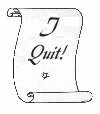


A lone hiker scrabbling in the Blue Ridge Mountains of Virginia, came upon a small, uncharted cavern and therein took refuge from a thunderstorm. Groping in the darkness for a comfortable place to wait out the deluge, it seemed at first that the clutter on the cavern floor was naught but dried animal bones and bat droppings. But then, briefly illumined by a lightning flash, he saw what appeared to be a chunk of crockery. This cavern, he decided, deserved closer inspection.
Subsequent investigation brought to light not only fragments of crockery, but also bits of parchment. Yellowed with age and somewhat curled, they bore markings which, when pieced together, seemed to be some manner of script or hieroglyphics.
Scrolls!!! It had to be scrolls! Whatever might they concern?
Bushels of bits were carefully collected and painstakingly pieced together. Assembled they resembled dozens of rolled-up jigsaw puzzles. The Blue Ridge Mountain Cavern Scrolls! An unwieldy name, that, for such a potentially historic collection of relics. But what else could they reasonably be called until their content became known? Were they records of the past? Or might they be prophecies? There was no way of knowing until at least some had been deciphered. And that might prove a long and ardous task.
Shortly, though, some patterns began to emerge as the first few were closely examined. A variety, they were, of fable and fantasy, poetry and prose, fact and possibly (though hard to determine) some fiction. The first several had at least one thing in common. They all pertained in one way or another, to past events and issues, the outcomes of which were already decided. Hence the name finally selected for them--what else but
But what purpose then, the labors of deciphering and transcribing? If the issues they dealt with were dead, why not leave them buried?
"Past is prologue"--"History repeats itself"--"Who learns not from mistakes of the past is destined to repeat them."
Such old fashioned maxims are perhaps passe in this modern, "Great" society. This, after all, is the year 1984, when Orwell predicted the capacity of "double-think" would be sufficiently developed that inconvenient or disturbing facts of history could be readily ignored or dispatched to oblivion in the "memory hole."
Even so, there remains one justification for these labors. If, in fact, no useful lessons can be learned from review of these dead issues of the past, then perhaps they'll prove amusing enough to help us ignore the truly vital issues of the present--until such time as they, too, will die or disappear.


